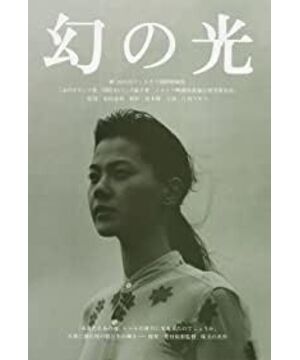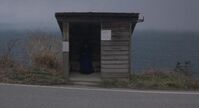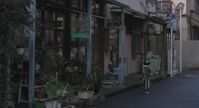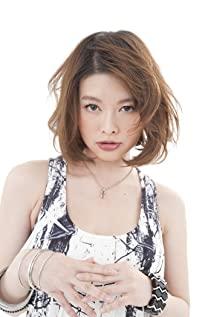dream
The movie starts with a dream: Yumiko, who failed to stop her runaway grandmother, encounters Yufu on a bicycle riding past her parents living on the street. Several key elements of the dream would magically recur in her life. The dream probably hinted at the origin of Yu Fu's lonely character. Yumiko's suicide was incomprehensible to Yumiko, perhaps because she didn't know how to be alone at that time. The neighbor is a person who deliberately amplifies the sound of the TV to make a noise. Yumiko laughs that the other party will applaud along with the TV, but Yu Fu understands that it is a kind of "performance", saying that the old man performs for others and he is actually very happy and very good, tell others about him still alive. Maybe Yu Fu has been performing all the time, so there is a sudden suicide.
The new husband said that some suicides are called away by a light, what is this light like? Is it better than life? This is probably incomprehensible to people who live in the sun. Death is a dark vortex, an unfathomable cave in this serene film.
Another person who was dying was Yumiko's grandmother, who insisted on dying in a place called "Su Mao". This dream outlines a simple family sketch. We can roughly guess that after Yumiko's father moved, the old man felt very lonely and lost a sense of belonging, so he wanted to leave to "protest" and "return to the roots". Yumiko's parents comforted themselves about the old man's running away, and they didn't even blame Yumiko. Mom helped Yumiko to absolve her of the responsibility, but for Yumiko, it seemed that it was better to be criticized, because the moral guilt still weighed in her heart many years later. When she moved to the seaside, she was very worried about the old lady who went to sea alone, which could not stop her grandmother's pain. When she saw the old lady hid and cried alone after she came home, as if her grandmother had finally come home, she actually worried about it for many years.
thing
The image of Yufu and the bicycle are almost bound together. The childhood Yufu appeared in front of Yumiko on a bicycle, and the adult Yufu lost the bicycle and stole another one, which seemed to compensate for some kind of deprivation experience. The two paint the stolen car, like a warm metaphor for a reunited family. The bicycle is not only a symbolic representation of Yu Fu's independent behavior, but also a metaphor for a small family. Yumiko "gets on his bike" is a symbol of starting a family with him, which is probably her childhood wish (her destiny is responding to her own dream). After Yufu passed away, Yumiko rode this bicycle alone for a while, the person has left, the family was forced to break up, and the bicycle has now become a "lonely bicycle"/broken family. The director deliberately gave a close-up shot of the bicycle leaning against the wall, which is probably the thing sad. The psychological recovery for Yu Fu's departure was also filled by bicycles. Yu Fu's son began to learn bicycles, and even the colors were the same.
The film captures a lot of objects: clothes racks in the rain, shoes piled up at a party, the sound of dense sewing machines, the noise of chainsaws, these are some symbolic sounds or objects that have been dyed with emotional colors with the meaning of life. It's like looking at old objects and reminiscing about past friendships, objects can capture something deep. Shooting objects can convey the "texture" of life, and some individual scenes also play the role of finishing the story. There are two scenes of Yumiko walking through the stairs in the film, one is to move house and the other is to return to the old place. Crossing the slope and the stairs is a metaphorical expression of the transition stage of life. The stairs are like "turning points". The process of integrating people and the environment has penetrated into semantics, so "going up", "going down" and "going in" all have mood changes. Go deep inside."
mourning
Yumiko's sudden departure caused Yumiko to experience a period of emotional dullness. Silence and depression are stressful states of mourning. Pain can be isolated but not completely avoided, and trauma returns after a period of silence. Yumiko's grief goes through several different stages, and her return to the tavern to listen to the owner recall the loss marks the start of grief, and she finally starts talking about it. Although intellectually she suddenly knew that she had lost a loved one, the "emotional knowing" came slowly. Emotional memory is condensed on the bell of the car key. In a scene where Yumiko talked with her new husband, the action of "hiding the bell" was to hide her feelings for her ex-husband, and "taking it down" was to put it down. Fortunately, the new husband accepted Yumiko, which helped Yumiko out of the trauma. Leaving tears is probably the end of mourning. Yumiko was summoned to follow the funeral team to the seaside, which became a farewell journey with her ex-husband in her heart. The director conveyed that state of mind with a highly emotional and imagery audio-visual language, so sad that the sky is snowing and everything is silent.
fade away
Let go of the past to begin, otherwise you will be locked in the past forever. The daughter sang the tune from her mother's mouth, the son began to like bicycles, and the passing of life seemed to fill the past. The picture of Yumiko's son and her new husband's daughter accompanying each other is poetic. The movie seems to outline a certain feeling. The "little boy on a bicycle" gets the company of the girl, which is like a repeat of Yumiko's dream.
"Light of Magic" expresses the passing of life through loss and mourning. Yumiko's dreams are always about the past, which is "the past that has passed away". She couldn't bear to face the passing away, so she repeatedly returned to the starting point. After marrying Yu Fu, she said that Yu Fu was "the same as when she was a child", which was her mentality of keeping her childhood, hoping that time would freeze. The runaway grandma means the irresistible death. On the one hand, the old man is "lost", and on the other hand, he perishes in the time dimension. The old man seems to be the proof that time is passing. The core image of "Phantom Light" is the train (and bicycle), and the train is also a distinct time symbol, which is in line with the theme of fading. The scene of Yufu riding a bicycle alongside the train appears twice, as if a person is racing against time, and he finally dies under the rails (in time). Yumiko's life changes are also shown through the pictures of buying tickets and riding a car. The time implied by the train does not wait for anyone. It is a symbol of objective time and the rolling years.
About the image of the train: The train is like an image that allows time to develop. Jia Zhangke's "Platform" and "The Good Man in Three Gorges" both focus on the use of the image of trains, especially "Platform", which takes the train as a prelude to the era, and even people play the role of the train in the scenes; Hou Hsiao-hsien's "Sadness" "City" uses a train to pass through to convey the transition of the times; Bi Gan's "Roadside Picnic" uses the reverse movement of the painting on the train to depict "rewinding time".
About its shortcomings: "Illusionary Light" does not see the flaws of human nature, and avoids the dimension of human conflict and evil. From children to the elderly, they are pure, and although there are misfortunes, they fall like cherry blossoms, which brings out the beauty of sentimentality. That kind of human nature feels like an unsophisticated child's perspective. When they call their neighbors' uncles and aunts, they are as close as relatives, and they are always full of smiles. But people may be much more complicated, and it is biased to see people as too good or too evil.
View more about Maborosi reviews










